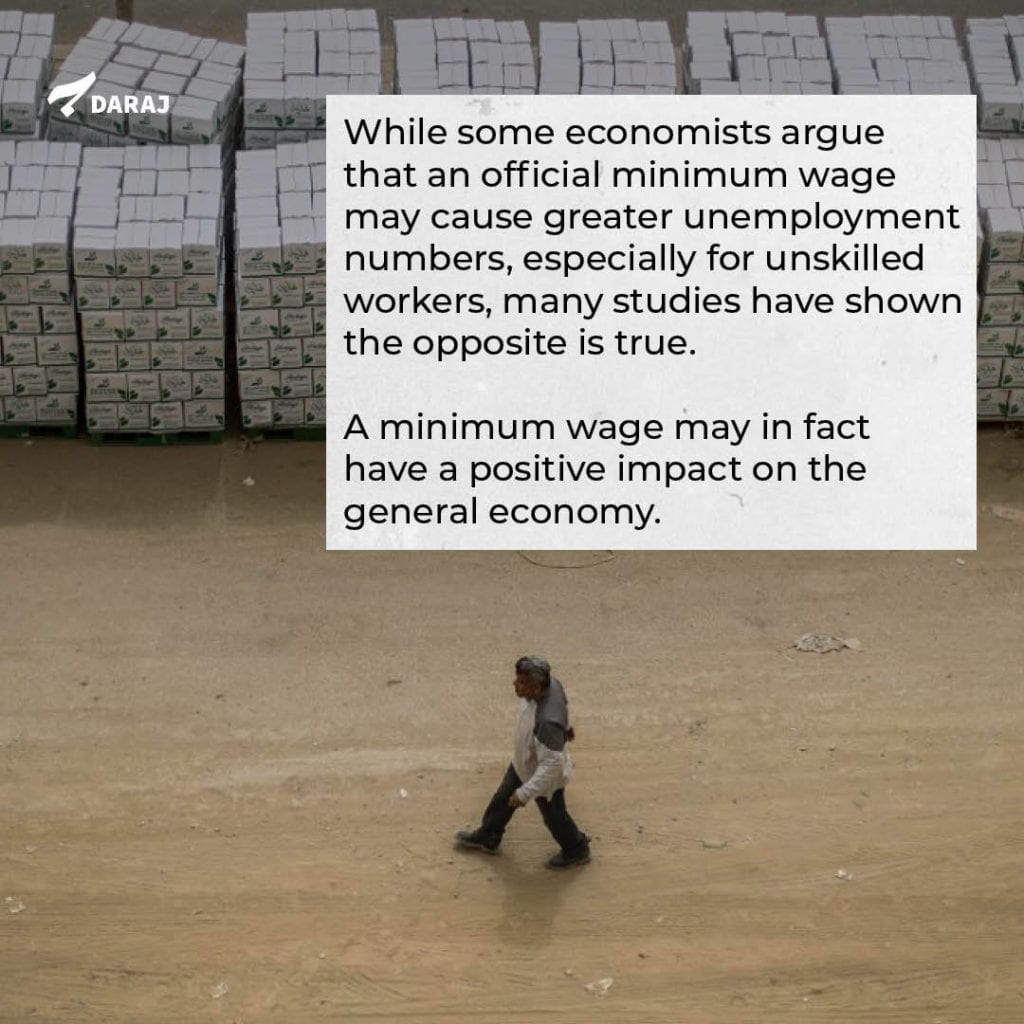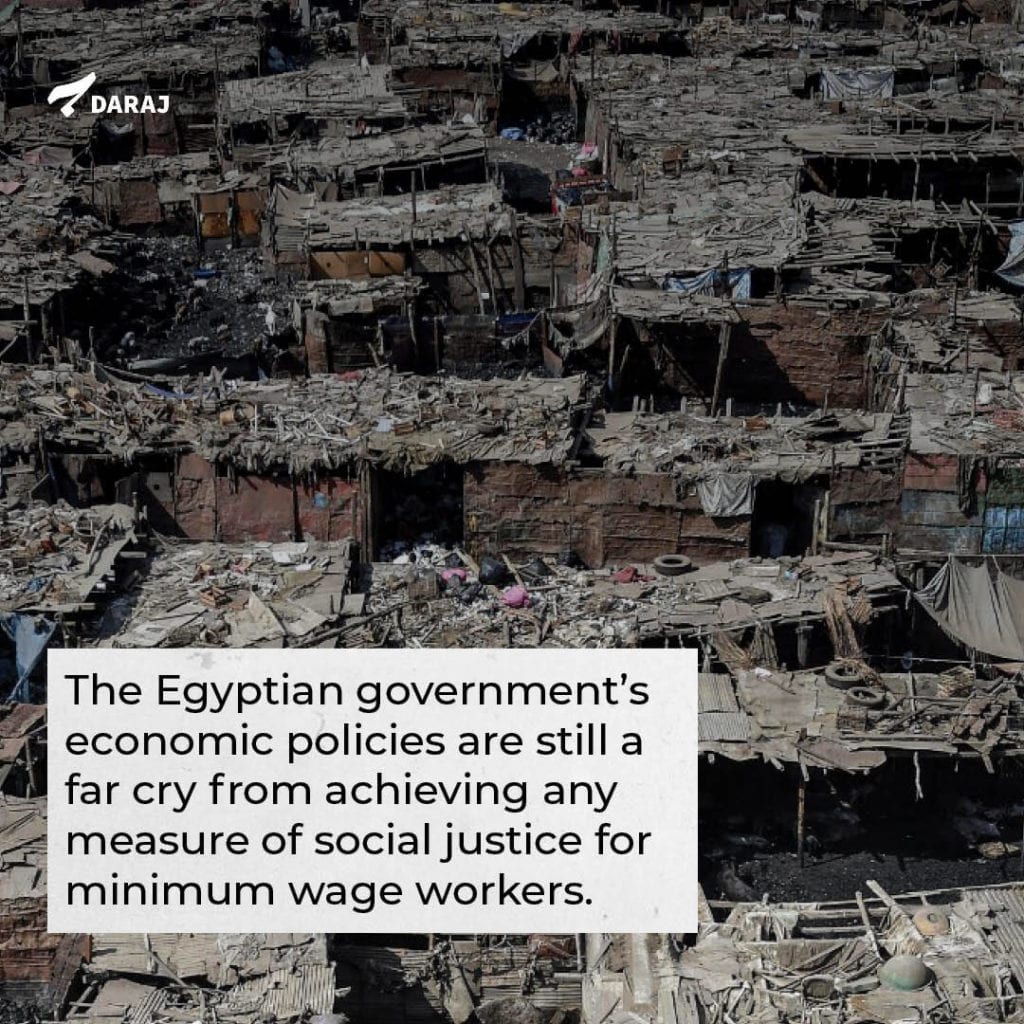The Egyptian government recently announced the Cabinet’s approval of President Sisi’s decision to raise the minimum wage for state-agency and economic public body employees from 2,000 pounds ($130) to 2,400 pounds ($155) a month.
The last increase of this kind took place in March 2019, and went into effect in July of the same year. Raising the minimum wage is always a positive thing, especially for people with low incomes.
However, in Egypt it is often not enough, given how low the salaries are in the first place, which has forced many state workers to search for other jobs. Both wives and husbands having two or more jobs is common in Egypt.

A state worker’s minimum wage is barely enough to pay rent for an apartment in a popular area. It doesn’t cover living expenses such as food, education and clothing. The small increase announced by the state every two years or so is really just a “subsidy” to jump above the poverty line, although (state) media warmly welcomed and applauded the increase as if it were a real solution.
The sour reaction to this increase compounds with workers in the private sector, who represent over 70 percent of Egypt’s labor force today. They’ve demanded a similar $25 increase, as the political elite for years had persuaded citizens like them to work for the lowest possible fee.
Who Sets the Minimum Wage?
A tripartite body representing employees, employers and the government named the National Council for Wages (NCW), is charged with determining national wage policies and proposing a proper minimum wage. Yet, the NCW has not been able to reach a consensus on such a minimum. Consequently, most wage earners in Egypt are still deprived of the protection offered by a minimum wage.
The latter is one of the most important governmental tools to achieve a measure of social justice and to prevent workers from being exploited by their employers, especially in times of high unemployment.
While some economists argue that an official minimum wage may cause greater unemployment numbers, especially for unskilled workers, many studies have shown the opposite is true. A minimum wage may in fact have a positive impact on the general economy, especially when facing a recession with large segments of the population burdened by a decrease in purchasing power.
Most countries have some sort of mechanism to set a minimum wage. At times the government is the sole power in imposing such a wage and forcing the private sector to follow suit. In other cases, countries rely on an independent body, which includes representatives from the government, business owners and labor unions, to decide or make recommendations to the government.
In Egypt, the government or executive authority is the decision maker, as the NCW is not an independent body. It is a governmental agency, founded by a decision made by the Prime Minister, and headed by the Minister of Planning and Economic Development.


Lacking Balance
In its recommendations on determining a minimum wage, the International Labor Organization (ILO) states it is necessary to use a “balanced and evidence-based” approach. This means finding a balance between the needs of workers and their families on the one hand, and the potential for economic growth and continued profitability on the other. “Evidence-based” means using statistical indicators on, for example, current wages, their distribution in different economic sectors, and the overall income gap. Naturally, they should also include average prices of goods and services.
Raising the minimum wage is always a positive thing, especially for people with low incomes. But in Egypt the measures taken are often not enough, given how low the salaries are in the first place, forcing many state workers to search for other jobs. Having two or more jobs is common in Egypt.
One way to set an appropriate minimum wage is to calculate the minimum price for a fixed basket of goods and services, representing the basic necessities for a family of four. Based on this, a group of Egyptian jurists in 2010 suggested a minimum wage of 1,200 pounds a month. Human rights lawyer Khaled Ali at that time obtained a ruling from the administrative court ordering the Egyptian government to impose a minimum wage.
So far however, the government has not provided any clarifications regarding the way the minimum wage is set. To put it more bluntly, it seems the only indicator used is the impact it would have on the state budget.
For example, in the Minister of Finance’s statements, the main figure he would refer to was a provision of 37 billion pounds to cover the additional burdens of the minimum wage increase, not taking into account that raising it to 2,400 pounds per month is still far removed from covering the basic needs of a family of four, especially given the current inflation rate.
A Taxed Increase
When they apply the minimum wage in a way that accumulates everything a worker is meant to receive, including incentives or bonuses, as well as what the employer pays for in social insurance, this means that this increase , supposedly around 400 pounds, is in reality often less than that. So who’s really benefiting from this increase then?
It is in that sense important to note that raising the minimum wage to 2,400 pounds per month, or 28,800 pounds annually, also leads to minimum wage earners exceeding the income tax exemption limit of 24,000 pounds. Thus, some of the increase they receive will be deducted by year’s end in the form of tax.
So the actual increase is in most cases negligible, and will hardly lead to a noticeable change in spending patterns that could positively affect the economy. Worse, the cash pumped into the market may boost inflation.
The Pandemic Doubled Poverty Rates
Interestingly, government officials and business owners stated that the coronavirus pandemic and its impact on the economy, was the main reason for the delay in reaching an agreement on the minimum wage for workers in the private sector.
They failed to mention, however, the pandemic’s impact on wage workers. Many companies stopped working and laid off employees. Others reduced their staff or cut their wages.
The pandemic caused a sharp increase in unemployment, and a decrease in the valuation of work, while adding a heavy burden on families to make ends meet and take measures to avoid infection. The groups most affected by the crisis, including small retailers and street vendors, will not be aided by the wage increase due to its small impact.
The Egyptian government’s economic policies are still a far cry from any measure of social justice. It is obvious that these policies mainly benefit employers. The government is not even trying to pressure them to set an adequate minimum wage.
Meanwhile, raising the minimum wage for state workers, at a small rate, at varying intervals, without any calculation of the actual cost of life or inflation rates, empties such a measure of having any desired effect on the economy.
As officials are keen to spread the news of a higher minimum wage, and make a lot of noise about it, the sad reality is that this measure, like so many other government measures, is a lot of fanfare with very little music.
Read Also:






